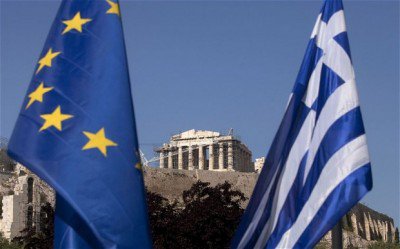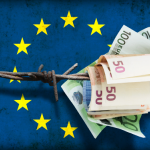Greece, the IMF and Goldman Sachs

Greeks massively voted NO to austerity. Now what?
No one can really tell what will come out of the upcoming negotiations with the Troika (International Monetary Fund, European Commission, European Central Bank). Meanwhile Austrians are signing a petition to leave the European Union and Greek’s Finance Minister, Yanis Varoufakis, has resigned. RT reports:
“One of the reasons for Varoufakis’s resignation was reportedly an acute conflict with Jeroen Dijsselbloem, president of the Eurogroup, which includes all the finance ministers of countries in the Eurozone.” (Varoufakis Resigns as Greek Finance Minister, Not to Hinder Forthcoming Negotiations with Creditors, RT, July 6, 2015)
In Binoy Kampmark’s view this is what might happen next:
More liquidity will be sought and observers are predicting that the European Central Bank will rebuff the request by the Bank of Greece. This will then trigger the effective withdrawal of Greece from the zone, if no capital can be found. To save Europe, it may well be incumbent that Greece exit it, at least in so far as the system has failed it. (Binoy Kampmark, Oxi in Greece: Saving the European Idea, Global Research, July 6, 2015)
Virtually absent from the mainstream media coverage are the IMF’s profit from Greek loans and the dirty role Goldman Sachs played in Greek’s finances.
The Jubilee Debt Campaign has released figures showing
“that the IMF has made €2.5 billion of profit out of its loans to Greece since 2010. If Greece does repay the IMF in full, this will rise to €4.3 billion by 2024.” (The IMF Has Made €2.5 Billion Profit Out of Greece Loans, Jubilee Debt Campaign, July 6, 2015)
As for Goldman Sachs, it
“allowed Greece to hide the true extent of its debt and […] ended up almost doubling the amount of debt Greece owed under the dubious derivative deals.” (Pam Martens and Russ Martens, Goldman Sachs Doesn’t Have Clean Hands in Greece Crisis, Wall Street on Parade, July 01, 2015)
In order to better grasp the crisis Greece is going through, Global Research invites its readers to take a look at the following selection of recent articles.
Selected Articles
 Varoufakis Resigns as Greek Finance Minister, Not to Hinder Forthcoming Negotiations with Creditors, RT, July 6, 2015
Varoufakis Resigns as Greek Finance Minister, Not to Hinder Forthcoming Negotiations with Creditors, RT, July 6, 2015
According to diplomatic source in Brussels, Varoufakis’s opponents consider that he intentionally protracted the debt talks in order to hold a referendum. “In these conditions there is lack of trust in the main Greek negotiator,” the source said.
 Austrians Sign Petition to Leave European Union, Joshua Krause, July 5, 2015
Austrians Sign Petition to Leave European Union, Joshua Krause, July 5, 2015
Over 260,000 Austrians have signed a petition calling for the EU exit for the country, and now the Austrian parliament must discuss a referendum on the issue.
 Oxi in Greece: Saving the European Idea, Binoy Kampmark, July 6, 2015
Oxi in Greece: Saving the European Idea, Binoy Kampmark, July 6, 2015
The devilry of the market is ever the enemy of democracy. Currency systems can never constitute political principles of worth. The stock market is no parliament.
 The IMF Has Made €2.5 Billion Profit Out of Greece Loans, Jubilee Debt Campaign, July 6, 2015
The IMF Has Made €2.5 Billion Profit Out of Greece Loans, Jubilee Debt Campaign, July 6, 2015
The IMF’s loans to Greece have not only bailed out banks which lent recklessly in the first place, they have actively taken even more money out of the country.
 Greece — The One Biggest Lie You Are Being Told By The Media, Truth and Satire, July 3, 2015
Greece — The One Biggest Lie You Are Being Told By The Media, Truth and Satire, July 3, 2015
In Greece, the domestic banks got more than $30 billion of bailout from the Greek people. Let that sink in for a moment – the supposedly irresponsible Greek government had to bail out the hardcore capitalist bankers.
 Goldman Sachs Doesn’t Have Clean Hands in Greece Crisis, Pam Martens and Russ Martens, July 1, 2015
Goldman Sachs Doesn’t Have Clean Hands in Greece Crisis, Pam Martens and Russ Martens, July 1, 2015
According to investigative reports … Blankfein, now Goldman Sachs CEO, Cohn, now President and COO, and Loudiadis, a Managing Director, all played a role in structuring complex derivative deals with Greece which accomplished two things: they allowed Greece to hide the true extent of its debt and they ended up almost doubling the amount of debt Greece owed under the dubious derivative deals.
 EuroZone Profiteers: How German and French Banks Helped Bankrupt Greece, Pratap Chatterjee, July 1, 2015
EuroZone Profiteers: How German and French Banks Helped Bankrupt Greece, Pratap Chatterjee, July 1, 2015
Today Greece owes its creditors €323 billion ($366 billion), some 175 percent of the country’s gross domestic product. “We should be clear: almost none of the huge amount of money loaned to Greece has actually gone there,” Joseph Stiglitz wrote. “It has gone to pay out private-sector creditors – including German and French banks.”

